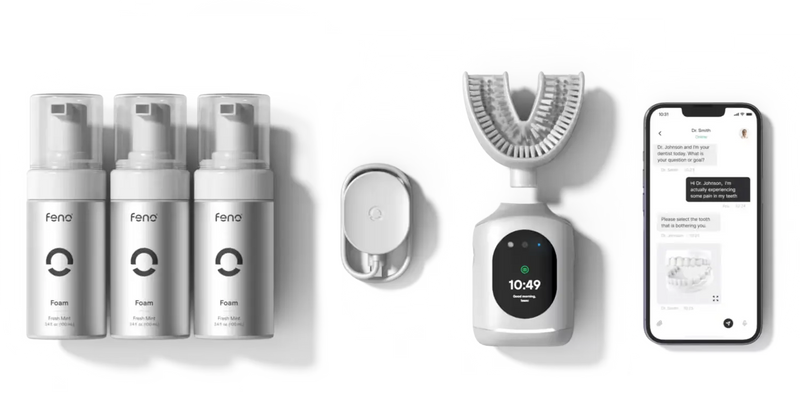
Can Chia Seeds Strengthen Teeth? Nutrients, Myths, and Facts
Essential Takeaways
- Chia seeds support tooth health as part of a balanced diet and nutrient strategy, but they're not a standalone solution. Their calcium benefits depend on pairing them with vitamin D and magnesium, maintaining good oral hygiene, and eating a varied diet. Not on chia alone.
Chia seeds have gained a reputation as a nutritional powerhouse, with many people turning to them for better bone and tooth health. But the reality is more nuanced. While chia does contain minerals essential for teeth, how well your body actually uses those nutrients depends on absorption rates, what else you're eating, and your overall oral care routine. Understanding the science helps you make realistic decisions about whether chia seeds deserve a place in your dental health strategy.
(Harvard T.H Chan School of Public Health, The Nutrition Source, 2023)
What Chia Seeds Actually Contain
Chia seeds are indeed rich in several minerals important for teeth and bone health: calcium, phosphorus, and omega-3 fatty acids. Research confirms that these nutrients play key roles in maintaining enamel structure and gum tissue. However, containing these nutrients and delivering them effectively to your teeth are two different things.
The Absorption Problem: Plant Calcium vs. Dairy Calcium
Here's where things get complicated. Chia seeds contain calcium, but your body doesn't absorb plant-based calcium as efficiently as calcium from dairy sources. The reason? Chia seeds, like many plant foods, contain phytates, a natural compounds that bind to minerals like calcium and zinc, making them harder for your body to absorb and use.
(Nutrients, 2021)
Studies show that while chia is a legitimate source of calcium, its bioavailability (the amount your body can actually absorb and use) is notably lower than from milk, yogurt, or cheese. In fact, some leafy greens like bok choy can deliver more usable calcium than chia. This doesn't mean chia is worthless, it means relying on chia alone for calcium isn't an effective strategy for tooth strengthening.
Making Chia Seeds Work Better: The Vitamin D and Magnesium Connection
The good news is you can boost chia's effectiveness. Research from Harvard's Nutrition Source confirms that vitamin D and magnesium work synergistically with calcium to improve absorption and utilization. Vitamin D facilitates calcium uptake in your intestines, while magnesium is crucial for the mineralization process that keeps your teeth strong.
Practical approach: Pair chia seeds with vitamin D-rich foods (fatty fish, egg yolks) or get adequate sun exposure, and include magnesium sources (leafy greens, almonds, whole grains). This combination amplifies what your body can actually extract and use from chia.
What Research Actually Shows About Chia and Tooth Strength
Some preliminary laboratory studies suggest that chia extracts might help remineralize enamel in controlled settings. However, this research involves chia extracts - not eating whole chia seeds as part of your normal diet. Animal studies indicate that long-term chia consumption may slightly improve bone mineral content, but clinical evidence in humans showing that chia directly strengthens teeth is lacking. In other words, the promise is there, but the proof isn't - at least not yet.
(Nutrients, 2018)
The Real Foundation: Oral Hygiene and Overall Diet
No superfood, including chia, can substitute for the basics: brushing twice daily, flossing, and regular dental care. Enamel erosion and decay happen regardless of how many chia seeds you eat if your oral hygiene routine is lacking. Research consistently shows that brushing, flossing, and professional cleanings are non-negotiable for protecting your teeth.
Additionally, chia seeds work best within a broader context of good nutrition. A balanced diet with varied whole foods, adequate protein, and diverse minerals will always outperform any single "superfood" approach. Think of chia not as a solution but as one piece of a larger nutritional puzzle.
Pro tip: The Feno Smartbrush™ features AI-powered health monitoring that tracks brushing effectiveness and identifies where you can improve. It builds the foundation that nutrients like chia can only support, because no supplement can replace effective, consistent care, but precision powered brushing can.
How to Actually Use Chia for Oral Health
If you want to include chia seeds in your diet for dental health, here's what the research supports:
- Add them strategically: Mix chia into smoothies with yogurt (calcium), citrus (vitamin C for gum health), and leafy greens (magnesium).
- Combine with vitamin D: Pair chia-based meals with foods like salmon or egg-based dishes, or ensure adequate sun exposure.
- Don't expect miracles: Chia is a nutritional support system, not a treatment or replacement for anything.
- Maintain oral care: Brush effectively (ideally with technology that gives you feedback), floss daily, and see your dentist regularly.
Bottom Line
Chia seeds contain nutrients your teeth need, but their benefit depends on three factors: how well your body can absorb their minerals, whether you're pairing them with complementary nutrients like vitamin D and magnesium, and whether you're maintaining solid oral hygiene and overall diet quality. Research supports chia as part of a comprehensive approach to oral health, not as a standalone solution. Think of them as a modest nutritional boost, not a game-changer.
Your teeth are stronger because of consistency: consistent brushing, consistent flossing, consistent nutrition, and consistent dental care. Not because of any single superfood.

Feno Founders Edition Bundle
Advanced Oral Health in 20 Seconds with the Feno Smartbrush™
Get Yours Now!





